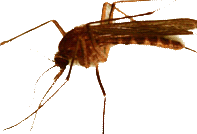
Image of Culiseta melanura mosquito, photo taken by Jason Williams, reproduced by permission from the Virginia Mosquito Control Association.
Eastern equine encephalitis virus (EEEV) is transmitted to humans by the bite of an infected mosquito. Eastern equine encephalitis (EEE) is a rare illness in humans, and only a few cases are reported in the United States each year. Most cases occur in the Atlantic and Gulf Coast states (see map). Most persons infected with EEEV have no apparent illness. Severe cases of EEE (involving encephalitis, an inflammation of the brain) begin with the sudden onset of headache, high fever, chills, and vomiting. The illness may then progress into disorientation, seizures, or coma. EEE is one of the most severe mosquito-transmitted diseases in the United States with approximately 33% mortality and significant brain damage in most survivors. There is no specific treatment for EEE; care is based on symptoms. You can reduce your risk of being infected with EEEV by using insect repellent, wearing protective clothing, and staying indoors while mosquitoes are most active. If you think you or a family member may have EEE, it is important to consult your healthcare provider for proper diagnosis.
General Information
- Page last reviewed: April 5, 2016
- Page last updated: April 5, 2016
- Content source:


 ShareCompartir
ShareCompartir